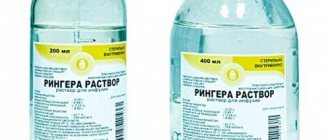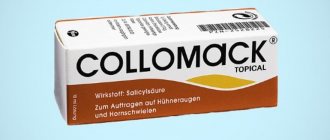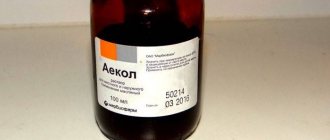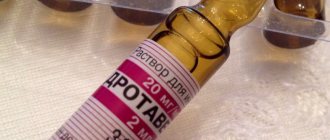The drug Disol (lat. Disol) refers to products with a combined salt composition. The solution is intended to compensate for fluid loss in the body and to detoxify it. According to the instructions for use, Disol takes part in regulating the plasma content in the blood thanks to the cations included in its formula, which eliminate the electrolyte imbalance in the intra- and extracellular space.
In addition, the product restores the acid-base state, prevents the formation of microthrombi, and improves microcirculation. Also, thanks to its active substances, the development of disseminated intravascular coagulation syndrome is prevented.
Disol: instructions for use
Polyionic crystalloid solution Disol is intended for rehydration therapy to replenish the volume of circulating blood, correct the balance of electrolytes, normalize the acid-base state, and detoxify the body.
It is used for parenteral administration by jet or drip, depending on the degree of dehydration and the stage of rehydration therapy.
It is prescribed to eliminate hypertensive dehydration, leading to metabolic acidosis, the development of a state of shock, and impaired filtration capacity of the kidneys.
The result of intense dehydration of the body due to various reasons is:
- Loss of electrolytes.
- Decrease in circulating blood volume.
- Development of hyperkalemia.
- Microcirculation disturbance.
Disol is intended to correct cellular dehydration and reduce potassium levels due to fluid loss.
Infusion therapy with the drug is carried out taking into account the daily fluid requirement individually for each patient. At the stages of parenteral rehydration, the doctor sets the rate of infusion of the solution, taking into account the patient’s condition and effectiveness criteria.
Elimination of decompensated hypovolemia is carried out within the first 2 hours. Disol is administered as a stream or drip after catheterization of the central veins. The solution is preheated to +37˚С. An increase in blood pressure allows the infusion rate to be reduced at the stage of final elimination of hypovolemia; the procedure lasts at least 6 hours.
Elimination of hyperkalemia and normalization of hourly diuresis allows for the further use of other crystalloid solutions.
How and where to store the drug?
The Disol solution must be hidden away from children. In this case, you must ensure that the bottle is tightly closed. The suitable storage temperature for the drug is 18-25 degrees. Do not place the product in direct sunlight.
If the solution becomes cloudy during storage or some flakes appear in it, then there is no need to use it. In this case, you should get rid of the drug.
The shelf life of the solution is 2 years.
The country of origin of the drug is the Russian Federation.
Release form and composition
Disol is produced in solution, which is a clear, colorless liquid.
100 ml of hypotonic drug for infusion contains:
- sodium chloride - 600 mg;
- sodium acetate trihydrate - 200 mg;
The excipient is water for injection, which is added to the required volume.
The molecular weight of acetate, chlorine, and sodium ions makes the solution hypotonic and allows it to be used to correct electrolyte shifts.
Available in bottles of different sizes made of glass or polypropylene. For use in stationary conditions up to 40 pcs. of various capacities are packed in a corrugated cardboard box. According to a doctor's prescription, 1 bottle is dispensed in a cardboard box. Instructions included. The composition and expiration date are indicated on the packaging.
Dropper Disol
Disol is a common combination drug that is often placed as a dropper. Let's figure out why it is needed and whether it can be used during pregnancy (and not only during pregnancy, but also during other complex conditions of the body).
About the drug
Disol is a drug that is a saline solution that is intended for detoxification and fluid compensation in humans. The substances that make up it help normalize the balance of electrolytes and regulate the composition of the blood. As a result, microcirculation processes are improved and the appearance of microthrombi, which can be dangerous to human life, is prevented.
The main active ingredients of the drug are sodium chloride, sodium acetate, and purified water. The medicine is sold in cardboard packages containing glass bottles of 200 and 400 ml.
When is it used?
There are several main cases when Disol is used. Typically these are the following two situations:
- the occurrence of hyperkalemia, that is, increased accumulation of potassium in human serum.
- intoxication of the body - usually we are talking about simple food poisoning, but there may be more complex cases of intoxication.
There are other situations in which this drug could theoretically be used, such as dehydration shock or therapy for kidney failure. The appropriateness of using the drug will be determined by the attending physician in each case individually. The doctor looks at the amount of fluid lost in a person and draws conclusions whether this dropper is necessary - or whether placing it in this case would be rather unnecessary.
How is it used?
The use of the drug should be carried out only with the participation of medical personnel; independent treatment with the drug is unacceptable. It is important that when administering the drug, the person’s medical parameters are constantly monitored.
First, Disol is heated to 37 degrees, the optimal temperature that allows the product to act as effectively as possible. Then intravenous administration is carried out (usually in the form of a dropper) in the volume determined by the doctor. The doctor takes into account various indicators to understand how much to introduce into the human body.
Pharmacological properties
The ionic composition of the saline solution allows it to be used at the stages of rehydration therapy to restore electrolyte balance and eliminate metabolic acidosis.
Eliminates cellular hyperhydration due to hypotonic properties. Helps eliminate hyperkalemia, restore peripheral microcirculation, and hourly diuresis.
Against the background of hypovolemia, it restores the required blood volume. Has all the properties of hydrophilic compounds.
Restoring the acid-base state and normal balance of blood electrolytes helps eliminate signs of intoxication against the background of exicosis in acute intestinal disorders.
Indications and contraindications for use
Infusions of Disol are prescribed for the purpose of rehydration in the following conditions:
- hypovolemic shock;
- infectious-toxic shock;
- oligoanuria;
- uncontrollable vomiting;
- severe exicosis.
It is important to understand what the Disol dropper is intended for. First of all, the drug is used for hypertensive dehydration, which is characterized by loss of intracellular fluid.
Parenteral administration of the drug is indicated against the background of severe exicosis in the following diseases:
- dysentery;
- salmonellosis;
- cholera;
- food toxic infections.
The drug is indicated for the elimination of hyperkalemia against the background of severe dehydration of the body. Prescribed for dehydration syndrome associated with drug and alcohol poisoning.
An extreme degree of exicosis and the impossibility of oral rehydration are indications for infusion of a saline drug in children.
Contraindications for infusion therapy are:
- Kidney failure.
- Decompensated chronic cardiovascular failure.
- Diseases accompanied by metabolic alkalosis, high levels of sodium ions in the blood.
- Intolerance to active substances.
The medication should not be used during long-term use of diuretics, corticosteroids, or with massive blood loss. The drug is not prescribed as monotherapy for parenteral rehydration.
What do people think about this solution?
The product “Disol” receives only positive reviews from patients. People note that this drug helped them cope with dysbiosis, as well as restore their body after poisoning with food, gases, and chemicals. Patients write on forums that after the first drop their health improved significantly, and soon they were discharged altogether. The speed of action of the Disol solution is its main advantage. People also note that with such an amazing effect, the cost of the drug is simply ridiculous. The only thing that review authors point out is that this product should only be used within the walls of a hospital. After all, only specialists will be able to administer the medicine intravenously and put in an IV. In all other respects, this drug is ideal.
Directions for use and dosage
For infusion of a hypotonic solution, catheterization of a peripheral or central vein is performed. Rehydration of severe excicoses requires massive infusions and frequent blood sampling for analysis.
Intravenous administration of polyionic liquid should be carried out under the control of laboratory parameters. The frequency of blood sampling for analysis of electrolyte content and hematocrit value is determined by the doctor.
Before infusion, the solution is heated to +37˚С.
In case of decompensated exicosis and signs of hypovolemic shock, jet injection of the solution is allowed during the first 2 hours.
The volume of injected fluid is calculated taking into account age and body weight. The amount of product must be at least 10% of the lost volume.
The criterion for effectiveness is an improvement in hemodynamics and an increase in blood pressure.
The final elimination of hypovolemia is carried out within 6 hours. The infusion rate is reduced. The infusion is continued until the level of potassium in the blood normalizes. To completely eliminate dehydration, other crystalloid solutions are added.
Restoration of hourly diuresis, improvement of peripheral microcirculation, elimination of signs of dehydration indicate the effectiveness of treatment and the possibility of switching to the oral route of taking medications.
Side effects and overdose
Disol can cause the following undesirable reactions:
- chills;
- heartbeat;
- swelling.
A hypotonic solution contains a lower concentration of salts and has a lower osmotic pressure than blood plasma. The drug, administered in large quantities, leads to swelling and lysis of cells.
Undesirable reactions occur when the solution is infused at high speed. An increase in total peripheral resistance with increasing blood flow turbulence will lead to overload of the right parts of the heart, an increase in pressure in the pulmonary circulation, and the threat of developing pulmonary edema. Correct determination of the type of dehydration, calculation of the required volume and rate of infusion, monitoring of hemodynamic parameters prevent the development of adverse reactions.
An overdose of the drug, manifested by pronounced undesirable effects, changes in blood electrolytes, requires immediate discontinuation of the administration of the medicinal solution. Symptomatic therapy and correction of electrolyte disturbances are necessary.
Special instructions and precautions
Before use, the medicine must be checked for the presence of impurities and sediment. Before heating the solution, you must ensure that the bottle is sealed.
Infusions of the drug should be carried out in a hospital setting. Monitoring of hematocrit and blood electrolytes is mandatory.
The drug Disol is indicated only if oral rehydration is impossible.
When prescribing crystalloid solutions to elderly people, it is necessary to take into account the discrepancy between the blood supply to the myocardium and the level of metabolism.
The rapid development of energy deficiency and the presence of concomitant diseases require careful use of an infusion solution and intensive restoration of hemodynamic parameters.
Disol is used in pediatric practice for extreme exicosis, an accurate diagnosis of hypertensive dehydration. Calculated using special formulas at each stage.
Infusion of the solution for severe exicosis, occurring with withdrawal syndrome, delirium tremens, should be carried out against the background of medicated sleep. This rehydration tactic in patients with chronic alcoholism helps prevent the development of cerebral edema.
Use during pregnancy and lactation
Pregnant and lactating women may prescribe Disol in exceptional cases. The risk of side effects of the drug on the mother and fetus should be minimal. There is no statistical data on the complete safety of solution infusions during pregnancy. The need to administer saline solutions requires stopping breastfeeding for the period of treatment.
If kidney function is impaired
Kidney diseases with impaired excretory function limit the use of Disol. Infusions of the drug in renal failure accompanied by severe electrolyte disturbances are not possible.
Disol is prescribed for transient, functional kidney failure that occurs against the background of dehydration. Restoring the volume of circulating blood, normalizing electrolytes, hematocrit, eliminates such disturbances with the normalization of hourly diuresis corresponding to age.
In conditions of shock kidney, rehydration is carried out by several infusion means.
Drug interactions
The polyionic hypotonic solution is compatible with any hydrophilic agents.
The combined administration of Disol and Insulin infusions provokes the development of hypokalemia.
Disol should not be mixed with the drug Oxaliplatin, which is used for intestinal and ovarian cancer. Saline solutions containing chlorides are incompatible with Oxaliplatin. The medication must not be diluted, dissolved, or mixed in one infusion system.
Considering the volume of infusion therapy and the need for simultaneous administration of several drugs, constant monitoring of the patient’s condition, monitoring of laboratory parameters and hemodynamic parameters is necessary.
DISOL Pregnancy
No negative effect of Disol on the condition of the fetus during pregnancy was detected.
The drug can be used in children and nursing mothers only as prescribed by a doctor. DISOL instructions for use
DISOL reviews
5
Regular drug. But don’t take it from Mosfarm in Sergiev Posad. They wrote storage conditions from +5 to +20. although in radars and all Russian other manufacturers it is up to +25. They received a 100,000 thousand fine from Roszdravnadzor. although there were bottles of the same Disol nearby in the closet. but others - up to +25. in the room it was + 23. Mosfarm let us down. We won’t take anything from him in life. Ovical radar instructions - up to +25
Helpful review?
Reply Comments
5
One day I ended up in the hospital with severe food poisoning. All after the holidays. We were visiting and how did it happen that out of all the guests, I was the only one who felt bad. Well, I will say that I have a very sensitive stomach and I have always somehow tried to monitor my nutrition. And then I don’t know what came over me. In general, I ate salads with mayonnaise and all that kind of stuff. In the end, what I wanted to say. About the drug Disol. To restore the water balance in my body, I was given Disol. He tolerated the drip with this remedy perfectly. I didn’t feel any side effects, the weight loss was normal. And the next day everything was fine.
Helpful review? 1
Reply Comments
SELF-MEDICATION CAN BE HARMFUL TO YOUR HEALTH
www.medcentre.com.ua
Analogs
There are no pharmacological synonyms for the drug Disol that are similar in composition and molecular weight of the active ingredients.
Disol analogues containing various active components related to rehydration agents are represented by the following preparations:
- Yonosteril;
- Trisol;
- Acesol;
- Hartmann's solution;
- Glucosolan;
- Dextrose;
- Sterofundin.
All substitutes or analogues of saline solution contain additional active cations. They are isotonic solutions with a physiologically balanced set of electrolytes.
Used to regulate water and electrolyte metabolism, reduce blood clotting and metabolic acidosis. Effectively improve capillary blood circulation, replenishing electrolyte and water deficiency.
Crystalloid saline solutions are not used as blood substitutes due to their relatively short duration of action.
It is not recommended to choose analogues of Disol on your own.
Impact on the ability to drive vehicles and complex mechanisms
Infusions of Disol prescribed to adult patients do not cause disturbances in psychomotor reactions and do not have a negative effect on drivers and persons operating complex mechanisms. Disol, after restoring electrolyte balance and normal circulating blood volume, is quickly eliminated from the body.
Contraindications
The drug "Disol" must not be used in the following cases:
- In case of hypersensitivity to the components of the product.
- In conditions that are accompanied by hypertonic or isotonic overhydration.
- In case of renal or liver failure.
- For serious heart or kidney problems.
This solution should be used with extreme caution if a person is simultaneously taking the drugs Salbutamol and Terbutaline, as well as insulin. Women who are in an interesting situation, as well as those who are breastfeeding, should be treated with this remedy with caution.






